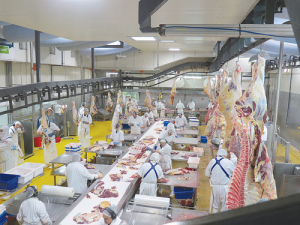Callaghan Innovation: Connecting industry problems with startup solutions
Gaining exposure to relevant innovation, "without being swamped in the sheer volume of options", is one of the main challenges for winegrowers considering agrictech.
 New technologies have potential to provide and export and tracking service for high-quality food producers.
New technologies have potential to provide and export and tracking service for high-quality food producers.
Blockchain and distributed ledger technologies have the potential to help our primary industries capture high-value niches, according to a new report.
They can help the sector connect more directly to consumers through supply chain innovations.
The report was commissioned by the Callaghan Innovation and blockchain venture studio Centrality.
The report ‘Distributed Ledgers and Blockchains – Opportunities for New Zealand’ by author Joshua Vial from entrepreneurial company Enspiral, outlined several blockchain initiatives now being used in the primary sector.
One example of primary sector work given in the December report is the AsureQuality Food Trust Framework.
NZ Post, AsureQuality (AQ) and NZ Trade and Enterprise have joined forces with Alibaba and local blockchain companies Trackback and Sylo to provide an export and tracking service for local, high-quality food producers.
“The project has been in development for over 14 months and is currently in a pilot phase. Chinese consumers consider fraudulent activity to be pervasive and a primary barrier to accessing safe food,” the report says.
“By scanning an AQ Assured Assurance Mark on their mobile phone a consumer can confirm their purchase is genuine and safe. Additionally, the project aims to connect NZ producers directly with Chinese consumers and remove intermediaries while maintaining high margins on premium products.”
The first participant is the HUI Maori collective to launch a broad offering of high-quality wine, manuka honey, natural snack bars and tonic water direct to Chinese consumers through an ecommerce platform.
The report says several projects here and overseas are focused on solving supply chain problems with distributed ledgers, which could have a significant impact on NZ’s primary industries.
NZ Post and Fonterra are also partnering with Alibaba to use blockchain technology to track consumers’ orders in an effort to increase food safety.
Centrality’s Trackback project is in live trials of a supply chain traceability solution to showcase NZ products in international markets.
Australian-based Blockgrain uses blockchain technology to help participants in the grain supply chain make better informed decisions, eliminate paperwork, reduce inefficiency and risk, open markets and increase profits.
Provenance is a blockchain company from the United Kingdom that is creating and fostering open, accessible information about products to transform the global economy. The company has completed pilot projects focused on tracing sustainably caught tuna and proving that farmers have received fair compensation.
The Meat Industry Association (MIA) is once again looking for game-changing ideas for New Zealand's red meat processing and exporting sector.
Environment Southland is inviting feedback on two bylaws that play a critical role in safeguarding the region's waterways and ensuring the safety of the local community.
While the North Island is inundated with rain, Southland is facing receding water levels as warm weather and lack of rainfall continues.
Entries have opened for the 2026 Fieldays Innovation Awards.
Organisers are expecting another full field of 40 of the country’s top shearers for the popular Speed Shearing event at this year’s Southern Field Days at Waimumu.
The Southern Field Days Innovation Awards have a great record in picking winners and the winner of the 2024 event will be putting up a display to support the event at this year’s show.